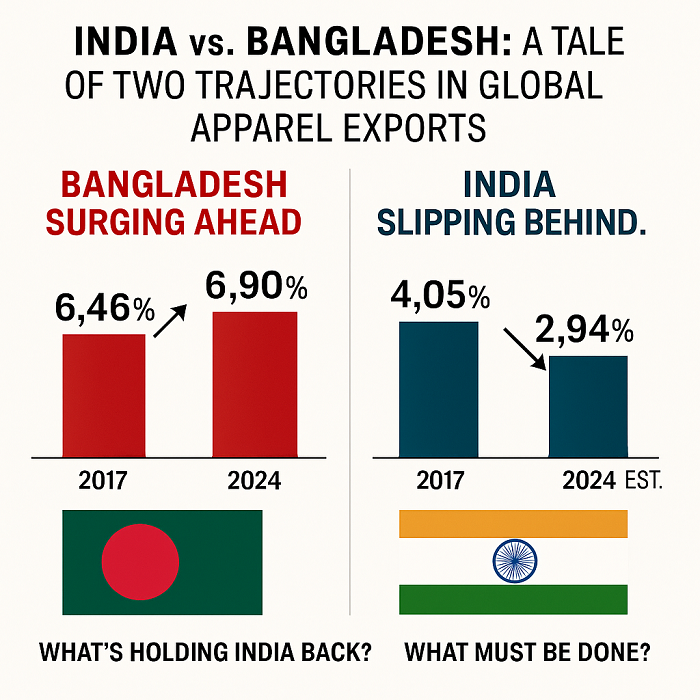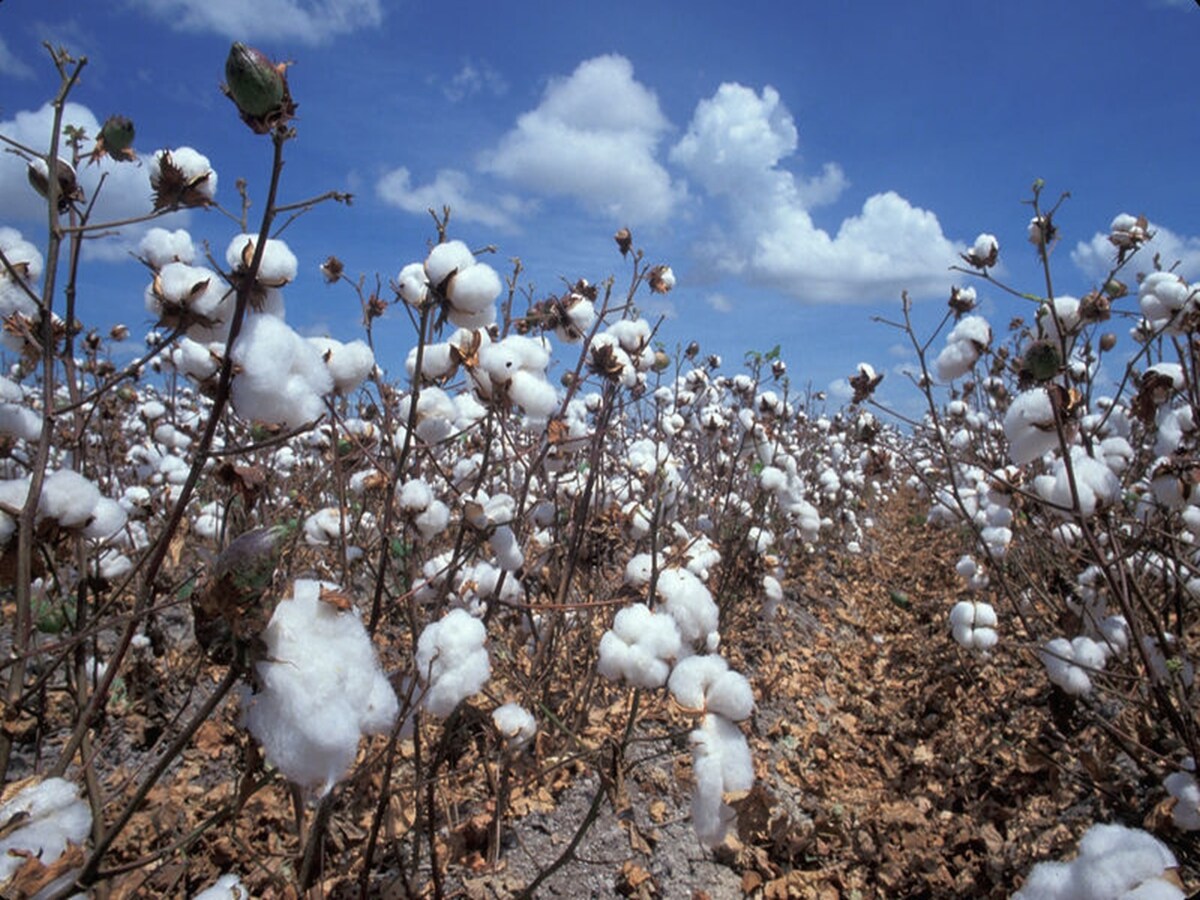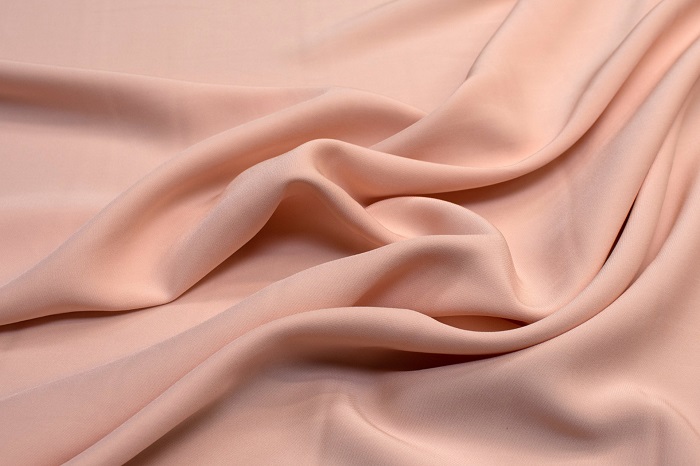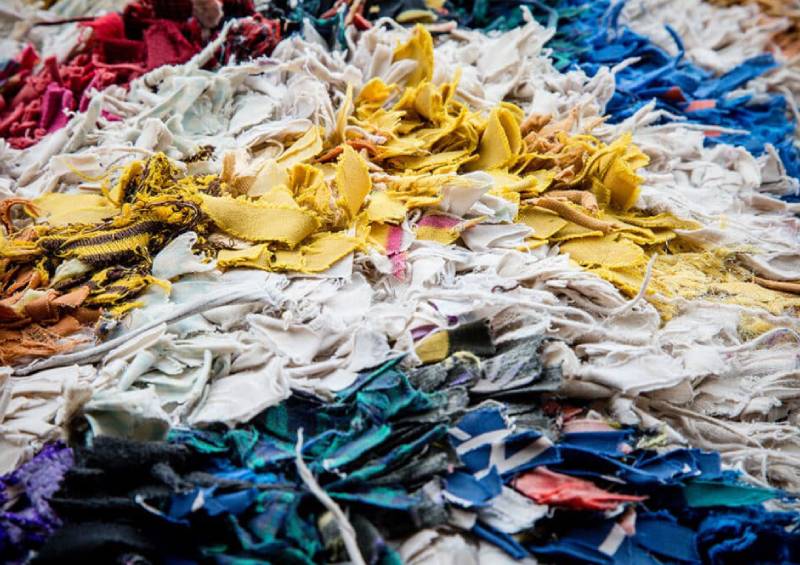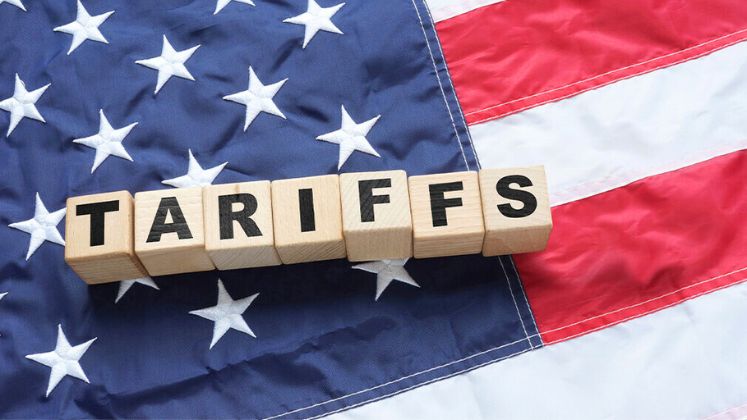FW
Swiftly ascending to becoming one of India’s top recycling companies, Badri Cotysn has, in just six years, achieved an impressive Annual Recurring Revenue (ARR) of Rs 500 crore, recycling an astounding six million PET bottles every day. At the heart of its operations is a state-of-the-art facility in Mandideep, Bhopal, where advanced technology converts waste into high-quality polyester fiber.
Established in 2018, by Sumit Gupta and Amit Gupta, Badri Cotysn aims to produce quality recycled materials while building a sustainable and scalable business model. The company aims to be one of India's top three plastic recyclers, supplying industries in textiles, automotive, and geo textiles.
Located in Madhya Pradesh's Raisen district, The Mandideep facility features an 800 kW rooftop solar installation, which powers the facility's operations, significantly reducing its carbon footprint. The plant transforms discarded PET bottles into a range of products, including Recycled Polyester Staple Fiber (r-PSF), recycled PP & HDPE granules, and PET flakes—sustainable alternatives to virgin materials. Badri’s efforts are bolstered by partnerships with major brands like Coca-Cola, ITC, and Pidilite, which utilie Badri's Extended Producer Responsibility (EPR) credits to offset their own plastic waste impact.
As demand for recycled materials rises, Badri Cotsyn has expanded internationally, with a growing presence in European and Middle Eastern markets. In the past year alone, exports have tripled. The company plans to further increase its capacity with a new Rs 150 crore facility in Bhopal, expected to triple revenues in the next three to four years. This new site will focus on meeting the surging demand for recycled plastics, especially for food-grade applications.
Through this integrated approach, Badri Cotsyn offers a compelling model of how tech-enabled solutions can drive change in recycling, presenting a blueprint for a more sustainable future in India and beyond.
Owner of the Gore-Tex® brand, W L Gore & Associates, is expanding its ‘Outerwear On Demand’ snowsports garment rental program to 15 additional locations in partnership with major players like Alterra Mountain Company, Powdr Corp, and Pacific Group Resorts, as well as select local retail shops. This expansion aims to make high-performance technical outerwear more accessible to skiers and snowboarders, building on the program’s success since its launch in the 2020/2021 winter season.
The program offers skiers and riders an opportunity to rent the latest premium Gore-Tex outerwear including jackets and pants designed for superior waterproof, windproof, and breathable performance, at an affordable price. The initiative is geared towards those seeking comfort, convenience, and high-quality technical gear without the need to purchase. All garments are inspected and professionally cleaned after each use to ensure top-notch quality for every customer.
The expansion is part of a broader strategy to make premium outerwear accessible to more skiers and riders. The goal of the ‘Outerwear On Demand’ program is to elevate the skiing and riding experience, says Chris Brennan, Program Lead. It gives resort visitors an opportunity to wear high-performance Gore-Tex outerwear and allows them enjoy the slopes in any weather, comfortably and confidently.
By providing high-quality, durable outerwear rentals, Gore-Tex also aims to encourage more people to participate in winter sports, allowing them to experience the mountains without the financial commitment of purchasing expensive gear. This model follows trends in the ski industry, emphasising convenience and quality, while encouraging more frequent participation and longer visits to resorts.
With the rental program’s sustained success, Gore-Tex plans to continue expanding its Outerwear On Demand offerings. As the demand for high-quality, convenient rental options grows, the brand remains committed to partnering with more resorts and retail locations, ensuring that skiers and riders across North America can hit the slopes comfortably, regardless of weather conditions.
Significantly boosting production to meet rising demand, Revalyu Resources plans to open its third PET polyester recycling plant in Nashik in Q3, FY25. A part of the company’s $100 million investment plan, the plant will add a capacity of 120 tons daily, allowing the Nashik site to recycle 35 million post-consumer bottles per day, with a total output of 280 tons daily.
Revalyu Resources recently commissioned its second PET polyester recycling plant at Nashik, India. The new facility recycles over 20 million used PET bottles daily, converting them into 160 tons of high-quality PET chips and PET polymer used in textiles, packaging, automotive accessories, and a variety of PET-based products. These recycled materials help customers achieve their sustainability goals across multiple sectors.
Revalyu uses advanced, patented glycolysis-based recycling technology with automated processes, making their operations scalable, profitable, and easily replicable. Their recycled PET production consumes 75 per cent less water and 91 per cent less energy compared to conventional oil-based PET manufacturing.
The company has a proven, scalable, and profitable technology that can transform used PET plastic back into virgin-grade quality PET polymer, notes Dr Vivek Tandon, Founder, Revalyu Group.
The new plant proves the commercial viability of chemical recycling at a global scale while maintaining a minimal environmental impact. The 100 per cent post-consumer recycled polymer manufactured by the plant can replace conventional PET in any application.
Looking ahead, Revalyu plans to establish a 240-ton-per-day PET recycling facility in the U.S. by 2027. Additionally, the company also aims to scale production to over 1,000 tons daily by 2030 through global partnerships.
Germany-headquartered Revalyu Group is owned by Heraeus, one of the top 10 family-owned companies in Germany, and continues to lead innovation in sustainable recycling technology.
From 63.3 million tons in 2022, global polyester production has increased by 15 per cent to over 73 million tons currently.
As per a report by a non-profit organisation, RMI Institute, this growth is largely being driven by the fashion, home furnishings, and furniture industries, especially fast fashion, which raises concerns about waste and carbon emissions. A single polyester t-shirt emits 20.6 kg of CO2 over its lifecycle, and with billions sold annually in the US, the environmental impact is substantial. Brands like Nike and Patagonia are responding by incorporating recycled polyester and other eco-friendly materials.
Polyester production starts with fossil fuel-based chemicals, such as naphtha and ethane, which are transformed into PET resin, the foundation for textiles, plastic bottles, and other products. PET's carbon footprint can be double that of other plastics due to its complex manufacturing process. Reducing emissions in polyester production is challenging because of high costs, slim profit margins, and the need for major capital investments. However, creating a specialised market for low-emissions polyester could make these investments worthwhile, similar to what's been done in the sustainable aviation fuel sector.
To cut emissions, PET suppliers can transition to renewable energy sources, while chemical producers can explore innovative methods like bio-based feedstocks, carbon capture, electrification, and recycling. On their part, retailers can lead by forming buyer alliances to set clear demand and price signals for low-emission products, following the model used in sustainable aviation. Meanwhile, feedstock suppliers and chemical manufacturers will need considerable funding to update production facilities, a process that can be supported through subsidies, tax incentives, and regulatory systems like the EU’s Emissions Trading System.
Creating a market for low-emissions polyester requires standardised certifications and aligned product standards. Consumer interest and the higher profit margins of sustainable fashion suggest that this approach is viable. Moving forward, the industry would need to balance voluntary initiatives with policy measures to hit emissions targets in the rapidly expanding polyester market.
Dominated by MSMEs, the Indian textile industry faces significant challenges in funding and access to technical expertise, according to a recent CRISIL Ratings report. These barriers hinder modernisation, affecting efficiency and global competitiveness. The fragmented structure of the sector limits diversification and awareness of labor rights, contributing to tough working conditions.
To address these gaps, government initiatives like the PM MITRA Parks scheme aim to provide advanced infrastructure and support for smaller businesses, addressing issues like inadequate logistics, e-commerce infrastructure, and consistent power supply.
Despite these hurdles, rising domestic demand, driven by a growing middle class, increased disposable incomes, and a trend toward athleisure and workwear, is expected to fuel growth. The Indian government targets $100 billion in textile exports by 2030 as against $44 billion in 2022. However, this goal depends on overcoming global competition, fluctuating cotton prices, and the absence of key trade agreements.
The report highlights, India is a dominant producer of cotton, which accounts for 23 per cent of global output. Yet, it lags in other areas like weaving and processing, where competitors like China excel. Although India has a 3 per cent share in the global ready-made garments market, it remains behind smaller rivals like Vietnam and Bangladesh due to better technology and lower costs.
Recent data indicates, India’s textile exports increased by 11.56 per cent Y-o-Y in Oct’24 to $1.83 billion while apparel exports rose by 35.06 per cent to $1.23 billion. The need for more Free Trade Agreements (FTAs) is critical, as competitors often benefit from duty-free access to key markets.
To meet evolving global demands, India must diversify from its cotton-centric production to synthetic and sustainable textiles, aligning with global shifts towards polyester. Expanding beyond cotton and investing in sustainable practices will be crucial for the Indian textile industry’s long-term success and competitiveness on the international stage.
The Lenzing Group, a leader in wood-based specialty fibers, highlighted its cutting-edge sustainable textile solutions at The Lenzing Conclave in Surat, hosted at Orange Megastructure LLP. The event gathered key stakeholders from the trade and greige fabric sectors, offering an exclusive platform to explore Lenzing’s innovative fibers for categories like Traditional Wear, Ethnic Wear, Fashion Knits, Intimate Wear, Fashion Wovens, and Denim.
Lenzing showcased its flagship products, Tencel A100, Tencel LF, and LenzingEcovero, emphasizing their superior softness, high lustre, and versatility. Tencel A100 stands out as a silk alternative, Tencel LF enhances cotton blends for durability, and LenzingEcovero promotes eco-friendly practices for diverse applications.
Avinash Mane, Senior Commercial Director for AMEA & NEA at Lenzing Group, stated, “The market demands fabrics that combine superior performance, lasting quality, and environmental responsibility. Through innovations like Tencel and LenzingEcover, we aim to provide comprehensive solutions, including fiber development, technical expertise, and supply chain optimization. Our focus is on fostering collaboration to set new sustainability standards.”
The conclave also spotlighted Lenzing’s holistic support for the textile industry, encompassing fiber and product innovation, technical assistance, marketing support, and supply chain solutions. Discussions at the event reinforced Lenzing’s commitment to sustainability and innovation, strengthening ties within the textile community.
Lenzing expressed gratitude to participants for their role in making the conclave a success and reaffirmed its dedication to driving sustainable advancements in textiles.
Kering has become the first company worldwide to adopt science-based targets for land and freshwater, marking a significant step in biodiversity protection. The announcement, made during COP16 on October 30, follows Kering’s year-long participation in the Science Based Targets Network (SBTN) corporate pilot. This achievement cements Kering's leadership in sustainability within the fashion industry and beyond.
The Group’s science-based targets encompass its direct operations, including Kering-owned tanneries, factories, and upstream suppliers. A key focus is the Arno basin in Tuscany, where most of Kering’s tanneries and supplier tanneries are situated. The basin represents a substantial portion of the Group’s water use, making it a critical area for the company's first freshwater quantity target.
Kering’s land-related targets aim to halt natural ecosystem conversion, reduce its land footprint, and drive engagement in relevant landscape initiatives. These actions align with the Group’s long-standing commitment to biodiversity and sustainable practices.
The adoption of these science-based targets underscores Kering’s strategic approach to addressing environmental impacts and promoting global biodiversity restoration. By leading this initiative, Kering sets a benchmark for the fashion industry and encourages cross-sector participation in sustainable development goals.
British actor Callum Turner has been appointed as the newest brand ambassador by brand Louis Vuitton.
Known for his roles in diverse projects including the historical drama ‘The Capture,’ the coming-of-age film,’Queen and Country and romantic comedy ‘Emma,’ Turner is particularly famous for his portrayal of Theseus Scamander in ‘Fantastic Beasts: The Crimes of Grindelwald.’ His penchant for perfection alongwith the diversity of roles played by him align perfectly with Louis Vuitton’s dedication to exceptional craftsmanship and constant quest for innovation, says the brand. It released several photographic images and a video with Turner carrying a Speedy P9 by Pharrell Williams to cement this partnership.
Turner joins several other individuals including football star Jude Bellingham, Korean music superstar, Lisa, and rapper Pusha T, who were all named as ambassadors by the French luxury brand earlier this year.
Hyve Group, a global leader in exhibitions, has announced the integration of its Pure brand into Spring Fair at Birmingham NEC from February 2-5, 2025. This move will create Moda x Pure, bringing together Pure and Moda under one roof to enhance Spring Fair’s position as a premier destination for the fashion sector.
The decision marks the end of Pure London x JATC as a standalone event at London Olympia. Hyve Group cited evolving market demands and the need for a more cohesive buying space for fashion retailers as driving factors for the transition. With Spring Fair already attracting key buyers, the merger ensures Pure’s legacy continues in a format better suited to industry needs.
Jackson Szabo, Retail Portfolio Director at Hyve Group, highlighted Pure’s 30-year history but acknowledged its current format is no longer sustainable. “By combining Pure and Moda at Spring Fair, we adapt to industry changes and strengthen our portfolio while continuing to offer commercial opportunities for brands and buyers,” he said.
Pure’s iconic catwalk will remain a highlight at Moda x Pure, showcasing trends and collections. The collaboration will include expert trend insights to support buyers and brands in staying competitive.
Hyve Group will also continue hosting Scoop International and Source Fashion at Olympia London. Scoop, a leading trade show for contemporary fashion, takes place February 9-11, 2025, before moving to the venue’s National Hall in July 2025. Source Fashion, Europe’s top responsible sourcing show, will continue its biannual editions, with the next scheduled for February 18-20, 2025.
These changes reflect Hyve Group’s commitment to evolving with the industry while maintaining its leadership in delivering top-tier fashion events.
Fair Wear, a multi-stakeholder initiative for garment workers' rights, has joined forces with the European Outdoor Group (EOG) to improve working conditions across the outdoor apparel supply chain. The collaboration aims to foster long-term, positive change by leveraging their collective influence.
Fair Wear, with 25 years of expertise in supporting fair employment practices, and EOG, representing over 143 organisations in the European outdoor industry, will address industry challenges through practical solutions. A key focus is integrating Fair Wear's recently launched Human Rights Due Diligence (HRDD) Academy into EOG’s network.
The Academy equips outdoor brands with actionable tools and expert guidance to implement human rights due diligence effectively and prepare for new regulations like the EU Corporate Sustainability Due Diligence Directive.
Victoria Lauer, HRDD Academy coordinator at Fair Wear, expressed optimism: “By partnering with EOG, we can significantly expand the HRDD Academy’s reach and its impact on improving working conditions in the outdoor industry.”
Katy Stevens, EOG’s head of CSR & sustainability, highlighted the importance of the partnership: “This collaboration strengthens our commitment to responsible supply chains by prioritising workers' rights as a core industry value.”
The organisations plan to drive change through in-person events and digital initiatives over the next year. This partnership underscores their shared vision for an outdoor apparel industry where garment workers globally enjoy safe, fair, and dignified employment.



